|
TRANSLATE THIS ARTICLE
Integral World: Exploring Theories of Everything
An independent forum for a critical discussion of the integral philosophy of Ken Wilber
 Ray Harris is a frequent contributor to this website. He has written articles on 9/11, boomeritis, the Iraq war and Third Way politics. Since 2007 he took to writing his novels Navaratri, Wild Child and Eden. Harris lives in Ballarat, Victoria, Australia. Ray Harris is a frequent contributor to this website. He has written articles on 9/11, boomeritis, the Iraq war and Third Way politics. Since 2007 he took to writing his novels Navaratri, Wild Child and Eden. Harris lives in Ballarat, Victoria, Australia.Don Quixote Rides AgainFact checking DillardRay HarrisNormally I would ignore much of what Joseph Dillard has to say. I've challenged his views before. As far as I'm concerned he's an ideologue, a Don Quixote charging at the windmills of his own imagination, constructing a fantasy dragon out of Integral theory. But I just couldn't let this one slide. The errors are just too egregious and duplicitous to ignore.
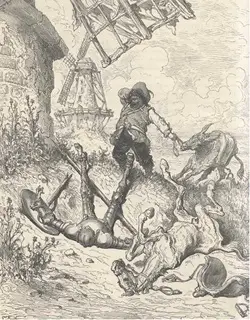
Why bother? I know it won't change his mind. Like most ideologues he is stubborn in his quest, immune to evidence. But as he often says, I write this in the hope of reaching others. Besides, I'm a bit of a nerd. I actually enjoy researching these things. This response will not rely on Integral theory. It doesn't have to. The mundane facts will condemn him. I will confine my remarks to one section of his recent writing because that is more than adequate to prove that he is at best a propagandist and at worst, a fantasist. They are his remarks on China in 'A Question Regarding Growth and Dominator Hierarchies'. “However, for the moment, for the purposes of our discussion, let us assume that they are true. When you combine these six factors, what you get is a society that is arguably more highly developed than that of the west. But if that is true, how does that not blow the integral developmental model, as applied to societies and civilizations, out of the water?” (1) Well, it might - if they were true, but as I will easily demonstrate his six factors are utter bullshit, an example of ideologically motivated imaginary dragons.
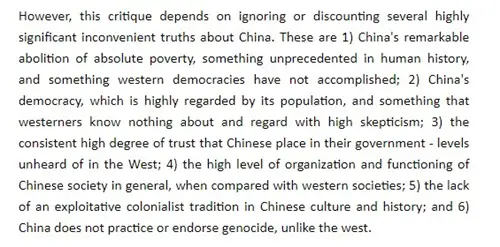 1) China's remarkable abolition of absolute poverty, something unprecedented in human history, and something western democracies have not accomplished. The immediately obvious error is that Dillard foolishly confuses 'absolute' poverty with 'relative' poverty. According to the accepted definitions. (2) “Absolute poverty refers to when a person or household does not have the minimum amount of income needed to meet the minimum living requirements needed over an extended period of time. In other words, they cannot meet their basic needs. When an individual goes below this threshold their survival is threatened.” To make this clear, when basic needs cannot be met people die, usually from disease and starvation. “Relative poverty is the level of poverty that changes based on context—it is relative to the economic climate. It is when a household receives 60% of the average household income in their own economy. They do have some money, however, not enough to afford anything above the basics. This group of individuals cannot afford the normal activities and opportunities that average earners have access to known as an 'ordinary pattern'.“ The chart below illustrates this principle (unfortunately it does not include China). Note: the term extreme poverty is the same as absolute poverty. This means that Vietnam, Turkey and the US have effectively ended absolute poverty. (3) 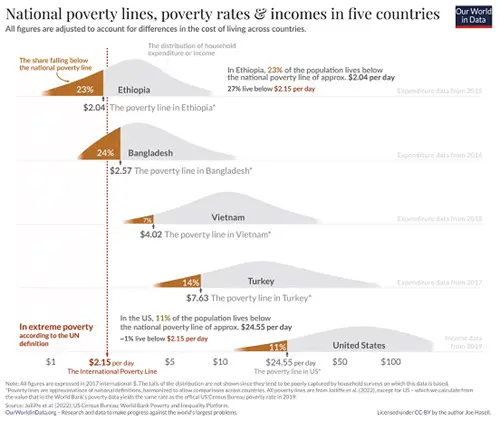 Dillard is right that China has made enormous progress in eliminating absolute poverty. The problem is that Western democracies eliminated it many decades earlier. However, what no country has done, including China, is eliminate relative poverty. This leads us to another important factor. Income inequality. This is the gap between the lowest income and the highest. This is measured using the Gini Coefficient. Zero represents perfect equality and 100 represents maximum inequality. The chart below demonstrates that as the Chinese economy has grown, so too has income inequality. (4) 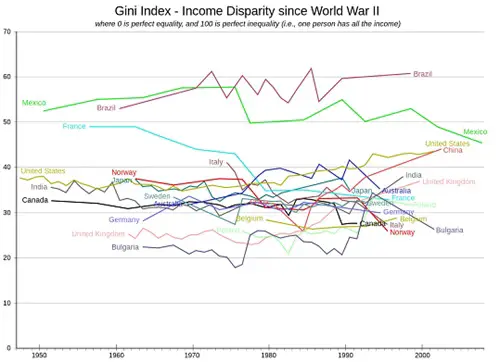 But which China? There are two. Mainland China - the PRC, and Taiwan, the ROC. As the PRC insists, they are one and the same people, with Taiwan considered a breakaway province. This allows us to compare the policies of the two systems. The evidence is clear. Taiwan has been more successful in lifting its population out of poverty. In fact the PRC was rather late to the game. But lifting people out of absolute poverty is not the only sign of a just economy. Quality of life matters. The European Industrial Revolution saw the mass exploitation of former rural workers in the new factories - the dark, Satanic mills. Working conditions were appalling. The whole point of socialist reform was to improve the condition of the workers. This was largely achieved through the creation of labour unions. As a result of industrial action and political pressure, laws were introduced to vastly improve the conditions of the workers: an eight hour day, five day week, paid sick leave, annual vacations, safe work places, improved wages, the end of child labour. Governments began to build a social safety net through unemployment benefits, aged pensions and subsidised healthcare. The stronger the union movement, the better the conditions. Here the US fails. The American oligarchs have successfully repressed the American union movement so that the conditions for workers are poorer than many of its OECD counterparts. And yet, despite being a Marxist-Leninist country, China does worse than the US in terms of working conditions. Europe reformed its dark, Satanic Mills, China has created them (in the Special Economic Zones). In a repeat of the historical mistakes of the past, poor rural workers are forced to work in appalling conditions for low pay. This has been widely documented and is an issue of concern for the global union movement. Put simply the PRC does not allow independent unions (when it took control of Hong Kong, the PRC acted immediately to outlaw several key unions). As a consequence workers are exploited. 12 hour days, 6 days a week, forced unpaid overtime, housed in cramped dormitories, subject to workplace abuse and unsafe conditions. This is not 'Western, capitalist' propaganda. In a report on the World Socialist Web Site, a worker in a steel factory writes: “The factory is very good at using subtle manoeuvres to break workers' unity. For example, the management does not allow too many workers to get together and chat. They use fines and bonuses to divide and conquer. They deliberately give conflicting work arrangements to set workers against each other. While all this happens, the management stays in air-conditioned rooms.” (5) A report from the Freedom Socialist Party states: “This growth was achieved on the backs of workers, particularly those migrating from inland provinces to special economic zones on the coast. Because social services are tied to people's home regions, these workers face lower wages, longer hours, no access to social services or benefits, and open discrimination. This is just like the conditions for immigrant workers elsewhere.” (6) 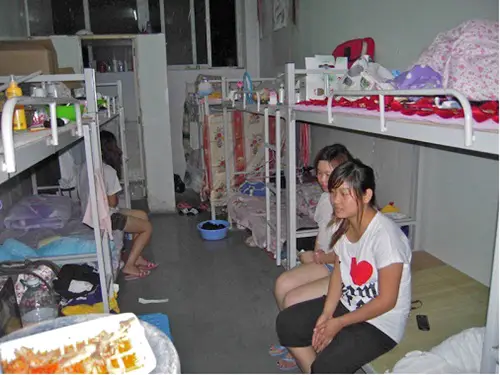 There is an irony in the 'Western' workers and socialist movements speaking up for worker's rights in the PRC. The recent success of the PRC in lifting people out of absolute poverty did not begin with the establishment of the PRC in 1949. It only began with the change of policy after the death of Mao and the ascension of Deng Xiaoping in 1978, some 30 years later. As a result of Mao's policies, especially the Great Leap Forward, significant sections of the population were plunged below the absolute poverty line leading to what has been called the Great Famine in which an estimated 40 million died. This is not a figure concocted by the West but admitted by Chinese academics as part of Deng's reform process (Boluan Fanzheng - trans: correcting chaos and returning to normal). (7) And what did those reforms involve? The opening of the previously closed Chinese economy to liberal market reforms. Today the PRC has created many successful corporations and around 607 billionaires, with Zhong Shanshan, the founder of beverage company Nongfu Spring, listed as the eighth wealthiest man in the world. (8) It is a capitalist economy with Chinese characteristics. The reality: Western democracies eliminated absolute poverty well before China, which was late to the process. It was only able to do so by rejecting Mao's policies and adopting Western style market reforms. 2) China's democracy, which is highly regarded by its population, and something that westerners know nothing about and regard with high skepticism It's not the claim that China's democracy is highly regarded by its people that I'm concerned about. That is easily debunked. It's the claim that it is 'something westerners know nothing about' that is obviously absurd. The PRC is not Shangri-La, the mythical kingdom hidden from the world. As a result of Deng's reforms China opened its doors to the world. Whilst the degree of openness has changed with each new leadership, there has generally been a reasonable exchange of ideas. Chinese students and academics study at Western institutions and vice versa. Chinese investors invest in Western property and businesses and Western corporations open businesses in China. China is open to tourism (a close friend organised a Feng Shui nd Qigong tour of the mainland) and the Chinese in turn tour Western countries. There are cultural, intellectual, business and sporting exchanges at every level. The only way a Westerner could be ignorant of the Chinese political system is through intellectual negligence. This is hardly surprising given how many people are wilfully ignorant of their own political systems. The reality is that Chinese officials openly promote the virtues of 'socialist democracy' or 'democracy with Chinese characteristics'. It is, by their own admission, a one-party system. The communist party follows much the same internal processes as Western political parties. It operates local branches who select representatives for the local, provincial and national levels. In this sense it is democratic. Ordinary people can speak to these representatives about the issues that affect them and these representatives then present these issues to the relevant authority. Local issues are indeed heard at the national level. So there is some form of 'voice of the people' democracy. 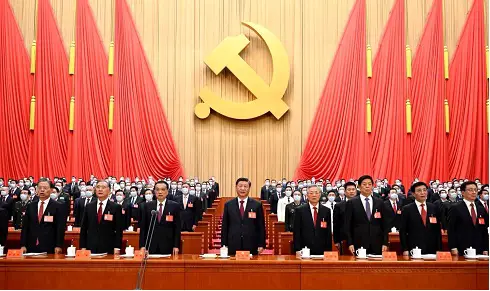 But that is where the similarities end. The key difference with the Western system is that the West allows multiple parties. I'm not going to use the US as a comparison. Distortions in that system make it effectively a two-party system. Instead I will refer to Australia, a multi-party system. I can speak of this with a great deal of confidence because of my involvement with the Australian Greens. I joined at the local level, was elected to be a state delegate where I was appointed convenor of the Global Issues Group (responsible for foreign policy) and convener of the Conflict Resolution Group (responsible for internal discipline). I was further elected to be a delegate at the federal convention and asked to run for the state executive (which I had to decline due to work commitments - it is close to a voluntary full time job). Two of my close colleagues of that time became federal senators: Richard Di Natale and Janet Rice. Richard replaced Bob Brown as federal leader. This means I have direct experience of how the political system works. The multi-party system allows a wide diversity of voices to be heard ranging across the ideological spectrum: socialist left to Tory right, secularists to theocrats, rural to city, as well as independents and single issue parties. The one-party system of China restricts representation to people who agree to the CCP platform. It actively discourages diversity in preference for conformity. The other key difference is the degree of top down command from the leadership. In the CCP the leadership can demand strict obedience to positions and policy (as witnessed with the harsh COVID crackdown). As the history of the CCP more than adequately demonstrates, the price of dissent can be very high with the possibility of lengthy jail terms or execution (China leads the world in executions). The most notorious of these post-Mao repressions is the Tiananmen massacre of 1989. (9) “The government actively suppressed discussion of casualty figures immediately after the events, and estimates rely heavily on eyewitness testimony, hospital records, and organized efforts by victims' relatives. As a result, large discrepancies exist among various casualty estimates. Initial estimates ranged from the official figure of a few hundred to several thousand.” 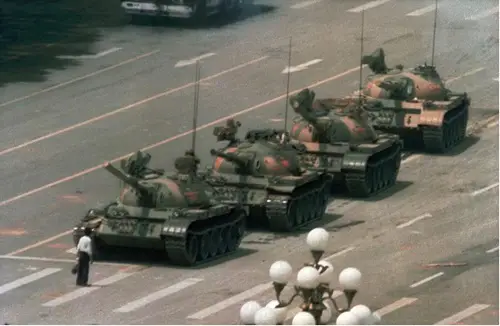 But there have been many more incidents during the rule of the CCP, especially during the dark days of the Cultural Revolution. The most notorious being the Guangxi massacre in which an estimated 100,000-150,000 died, often in the most brutal and cruel way. “Methods of slaughter included beheading, beating, live burial, stoning, drowning, boiling, and disemboweling." (10) Thankfully that era has passed (and denounced), but it doesn't mean there is no internal criticism of one-party rule. There are plenty of dissidents in the diaspora community. In 2008 a group of 303 dissident intellectuals published Charter 08, which called for the reform of the one-party system. “This year marks 100 years since China's [first] Constitution, the 60th anniversary of the promulgation of the Universal Declaration of Human Rights, the 30th anniversary of the birth of the Democracy Wall, and the 10th year since the Chinese government signed the International Covenant on Civil and Political Rights. Having experienced a prolonged period of human rights disasters and challenging and tortuous struggles, the awakening Chinese citizens are becoming increasingly aware that freedom, equality, and human rights are universal values shared by all humankind, and that democracy, republicanism, and constitutional government make up the basic institutional framework of modern politics. A “modernization” bereft of these universal values and this basic political framework is a disastrous process that deprives people of their rights, rots away their humanity, and destroys their dignity. Where is China headed in the 21st century? Will it continue with this “modernization” under authoritarian rule, or will it endorse universal values, join the mainstream civilization, and build a democratic form of government? This is an unavoidable decision.” (11) The reality: the Chinese system of democracy is well understood by anyone who cares to know. 3) the consistent high degree of trust that Chinese place in their government - levels unheard of in the West This is a curious point to make. It is based on a legitimate survey in which China does indeed perform better than any Western country - alongside Saudi Arabia and the United Arab Emirates. (12) Of course, anyone who understands statistics will approach the data with a critical eye. What was the sample size? Was it a representative sample? And trust in what exactly? The fact is that there are a wealth of surveys studying the issue of trust: in other people, in the professions, in politicians, in government. All yielding different results in which the West performs well. (13) We can also ask slightly different questions. When you survey the level of corruption you get an entirely different picture. According to Transparency International, (14) the top ten least corrupt countries (with the exception of Singapore) are ALL Western, with Denmark top of the list with a score of 88. China sits in the lower half with a score of 42. 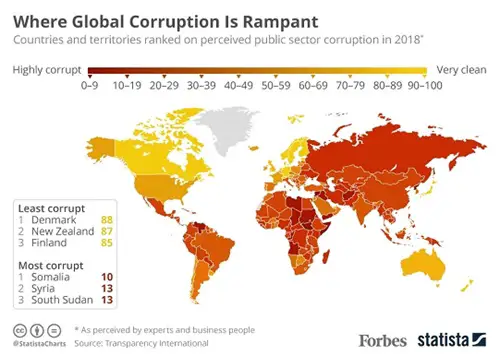 We know that the issue of corruption is a major concern in the PRC. We don't have to rely on 'Western' sources to understand this. We only need to read official party press releases. “Over the ensuing decade, corrupt officials were punished, ranging from high-ranking figures like Zhou Yongkang, Bo Xilai, Sun Zhengcai and Ling Jihua, to leading officials of ministries, state-owned enterprises, and key officials at the provincial and municipal levels, as well as low-ranking officials at the county and township levels.” (15) This immediately raises the question of how corruption was allowed to become such a problem given the CCP has had such a tight grip on power. Who else could be responsible? Could it be that corruption is the result of a one-party state where people are afraid of speaking up? The official party press release admits as much. “Over 30 years ago, Xi, then Party chief of Ningde Prefecture in Fujian, discovered that thousands of officials in Ningde were illegally using land to construct private homes. There would be no way to address these violations without offending individuals.” (15) So, is a high level of trust in government a good thing? I think we might agree that high mistrust can be dysfunctional. Look at the polarisation in US society and the proliferation of paranoid conspiracies. Pedophile rings operating from Pizza restaurant basements that don't exist. Allegations of election fraud with no substance. The list is almost endless. And yet, on the other hand, isn't a degree of scepticism about the government a healthy thing? In this sense might we not interpret a high degree of trust as a symptom of conformity? Consider the five top countries in terms of trust: Saudi Arabia, China, the UAE, Singapore and India. Are these not conformist, authoritarian countries? This would suggest a middle ground of healthy scepticism that demands transparency and accountability. As it so happens, it is possible to measure accountability and on this measure China performs poorly, sitting at 165 out of 171 (with Saudi Arabia at 166 and the UAE at 153). And the top 10? ALL Western. (16) The reality: high trust correlates to authoritarianism, which would indicate it is really a measure of conformity. 4) the high level of organization and functioning of Chinese society in general, when compared with western societies I can't resist the cliché: Mussolini might have been a bastard, but at least he made the trains run on time. How does one measure the level of organisation and functioning of a society? Isn't this called efficiency? In which case I think the Swiss might have something to say about the efficiency of their system. As it happens there is also a table for this and again China performs poorly, sitting at 56 out 193. The top 10? Singapore is at the top, with 7 being Western countries. (17) I've already mentioned the issue of corruption. The other is bureaucratic red tape. It seems that Dillard has simply made this claim up and I think it indicates something important about his political concerns. In point 1 it is about economic security. In point 2 it is about a one-party system. In point 3 it is about conformity. In this point it is about efficiency. Security, single party authoritarianism, conformity and efficiency. Think about it. I'll return to this point later. The reality: Western societies are actually more efficient than the PRC. 5) the lack of an exploitative colonialist tradition in Chinese culture and history Anyone who understands Chinese history will laugh at this ridiculous claim. Chinese history consists of the rise and fall of empires. It is a history of violent expansion, internal rebellion and almost paranoid contraction and isolationism.
After the defeat of the nationalists, the PRC turned its attention to the west, expanding its territory to incorporate Tibet and consolidating its control of the Turkic-Muslim province of Xinjiang - both lands that had been colonised by previous Chinese imperialist expansion. The reality: China has a long history of colonial expansion and exploitation. 6) China does not practice or endorse genocide, unlike the west. Utter bullshit. Despite his many accusations that his imaginary dragon 'Integralists' are hypocrites, Dillard proves himself to be the biggest hypocrite of all. Of course China is guilty of genocide. Dillard has complained bitterly that his imaginary 'Integralists' support the Israeli genocide in Gaza (arrogantly demanding they answer to him). He has been at pains to draw people's attention to South Africa's case in the ICJ and to remind people of the definition of genocide. He complains bitterly that Israel will probably ignore the ICJ ruling, apparently blithely unaware that his beloved Russia completely ignored the March 6, 2022 ruling of the ICJ that: (19) “(1) By thirteen votes to two, The Russian Federation shall immediately suspend the military operations that it commenced on 24 February 2022 in the territory of Ukraine; (2) By thirteen votes to two, The Russian Federation shall ensure that any military or irregular armed units which may be directed or supported by it, as well as any organizations and persons which may be subject to its control or direction, take no steps in furtherance of the military operations referred to in point (1) above.“ (This means the Donetsk and Luhansk puppet People's Republics). If Dillard expects Israel to obey international law, then he must also expect Russia, China and every other country to do likewise. And if he insists on using the standard definition of genocide he must agree that by that same definition the Chinese actions against the Tibetans and Uyghurs are widely accepted as examples of genocide. For goodness sakes, the wikipedia entry on the Uyghurs is called 'The Uyghur Genocide' (20). Here's what the NGO 'World Without Genocide' has to say about Tibet. (21) “These practices have included use of forced labor resulting in the deaths of thousands of Tibetans; forced sterilization of women; widespread famine from the destruction of farmland and irrigation systems; destruction of trade and commerce, devastating the livelihoods of thousands of Tibetans; systematic religious persecution and forced indoctrination into Communist ideology; large-scale bombing; confiscation of property from monasteries, private individuals, and former Tibetan officials; imprisonment, deportation, torture, and murder of thousands of people; and the transfer of Han majority people into the region.” 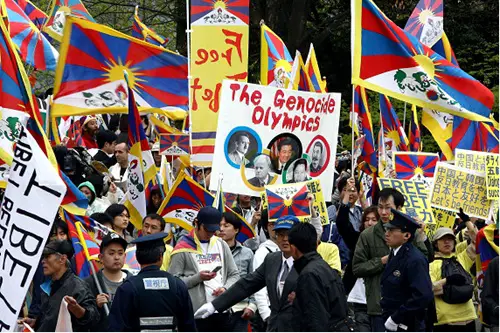 And on the Uyghurs in Xinjiang it says: “China wants control of Xinjiang for another reason. Xinjiang is expected to produce 35 million tons of crude oil by the end of 2020. Xinjiang also has the country's largest coal reserves—an estimated 40 percent of China's national total, and the country's largest natural gas reserves. And the Uyghurs are sitting on it.” To drive home the point, here's what another NGO 'Genocide Watch' has to say: (22) “Even more pernicious than Beijing's attack on Buddhism is its assault on the Tibetan language, a campaign that bears all the hallmarks of a multigenerational project to render a language dead and thus eliminate a people's identity. In a report published by Human Rights Watch, Tibetan sources on the ground describe how China's new education policy, deceptively labeled “bilingual education,” has been replacing Tibetan with Mandarin Chinese as the medium of instruction not only in primary schools but in kindergartens across the Tibet Autonomous Region (TAR).” On the situation in Xinjiang: “Since 2017, between 800,000-2,000,000 million Uyghurs have been held in Xinjiang's concentration prisons, commonly referred to as "re-education camps." Uyghurs are forced to participate in CCP indoctrination programs in which detainees are forced to abandon their Muslim faith and culture. The CCP forbids use of the Uyghur language and imposes Mandarin Chinese within these camps. Inside camps, CCP officials subject Uyghurs to physical beatings, sexual assault, and gang rapes of women. The Chinese government's family planning program restricts Uyghur and Turkic Muslim reproduction, preventing births in violation of Article 2d of the Genocide Convention. According to Adrian Zenz between 2015 and 2018, East Turkistan's Uyghur population growth rate fell by 84%. State-sponsored forced inter-racial marriages between Uyghur women and Han Chinese men are part of "family planning" policies, as are female sterilisations, forced abortions, mass rapes, and sexual torture. The CCP forces Uyghur women to live with Han Chinese men in Uyghur homes. The CCP forcibly removes Uyghur children from their homes and places them in residential schools where they are forbidden to speak the Uyghur language, a violation of Genocide Convention Article 2e.” (23) 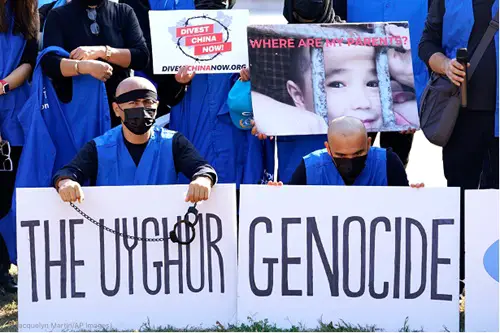 In short, the PRC is currently engaged in an ongoing policy of genocide against the Tibetan and Uyghur people. But China also has a history of genocide and massacre. (24) Just a few examples:
The reality: Dillard is an apologist for Russian and Chinese war crimes and genocide. His moral outrage is selective and his failure to recognise and condemn this ongoing genocide makes him complicit. Conclusion:You don't have to refer to any developmental theories to understand where Dillard is coming from. When we consider his six points the pattern is obvious. They reveal his primary concerns: economic security, political stability, conformity, efficiency and historical revisionism. Is it any wonder he's an apologist for Russia and China? Afterword: slavery in Tibet.Elsewhere in his article Dillard repeats the Chinese propaganda lie that Tibetan monks supported slavery: “The implications of this logic for higher levels of development are not pretty. For example, what do we get when we find non-dual Tibetan monks supporting generations of functional slavery?” The reason for perpetuating the lie is to justify the genocide of Tibetan culture. The irony here is that it copies the 'white saviour' myth of European colonialism. The morally superior Chinese communists invaded Tibet to save the people from their primitive ways. Instead it simply reveals Dillard's appalling ignorance and bigotry in regard to both Tibet and Tibetan Buddhism. It is true that Tibet was a feudal society with a rigid class system. But so was every surrounding country, including China and India (as well as Nepal, Bhutan and Afghanistan). Tibetan culture was influenced by China and India. And yes, it is true that a form of slavery existed in Tibet, as it existed in China - the exalted Confucius, a member of the aristocratic, slave owning Yin caste, defended slavery - and India, and Bhutan and Nepal. This has nothing to do with some alleged moral failings of higher stages of development. Following Dillard's logic we would have to dismiss the cultural achievements of the Greeks because they supported slavery and made a virtue of pederasty. Throughout history high culture exists alongside low culture. The nondual Tantra of Padmasambhava arose in India in the 8th century, a time in which every country was feudal. What Dillard does not understand is that Tantra rejected many of the feudal norms of the period. It rejected the caste system and rituals of the Brahmans and accepted and celebrated female aspirants. In Tibetan Tantra, Padmasambhava's consort Yeshe Tsogyal is recognised as a fully realised Yogini. And whilst later sects took a more hierarchical and patriarchal approach, Tibetan Buddhism was nonetheless open to the lower classes. Both Panchen and Dalai Lamas are recorded as having been reborn in peasant families, including the current Dalai Lama. A further problem with Dillard's accusation is that the Chinese are guilty of committing the human rights abuse of modern slavery, especially the forced labor of Tibetans and especially, Uyghurs. (25) It takes a special kind of hypocrisy to allege slavery whilst engaging in slavery. According to the anti-slavery NGO 'Walk Free': “Forced labour is exacted under the guise of vocational training and poverty alleviation—a scheme promulgated by the CCP to raise living standards in “ethnic areas.” It is primarily facilitated through the transfer of rural populations to work in farms and factories, and the involuntary placement of detainees and ex-detainees in factories located inside or near “re-education camps” in the Uyghur Region and factories across China. Several global supply chains are tainted by this exploitation, including cotton, garments, electronics, polyvinyl chloride (PVC), solar-grade polysilicon (used in solar panels), and personal protective equipment (PPE). Similar patterns of abuse are evident in the Tibet Autonomous Region, with reports of labour transfers occurring in construction, textiles, security, and agriculture both as a means of religious discrimination and political indoctrination of Tibetans.” (26) Dillard likes to position himself as moral judge and jury (really, just a moral bully). He argues that people who fail to condemn atrocities and human rights violations to his liking are complicit in those crimes and abuses. Following his own moral code, I accuse Dillard of being complicit in the many human rights abuses of China and Russia. NOTES:1. Joseph Dillard, "A Question Regarding Growth and Dominator Hierarchies", www.integralworld.net 2. "Relative Poverty vs. Absolute Poverty", March 2023, endpoverty.org 3. Joe Hasell, Max Roser, Esteban Ortiz-Ospina and Pablo Arriagada, "Poverty", ourworldindata.org 4. OECD Data, "Income Inequality", data.oecd.org 5. "A steelworker in China writes about his working conditions", www.wsws.org, 16 August 2023 6. "Chinese workers take on super-exploitation", socialism.com 7. "Great Chinese Famine", en.wikipedia.org 8. "Zhong Shanshan", en.wikipedia.org 9. "1989 Tiananmen Square protests and massacre", en.wikipedia.org 10. "Guangxi Massacre", en.wikipedia.org 11. Human Rights in China, "Charter 08", archive.md (hrichina.org) 12. "Share of population who trust their government worldwide 2023, by country", www.statista.com 13. Esteban Ortiz-Ospina and Max Roser, "Trust", ourworldindata.org 14. "Corruption Perceptions Index", www.transparency.org 15. "Xi's uncompromising fight against corruption", english.scio.gov.cn, January 11, 2024. 16. "Government accountability - Country rankings", www.theglobaleconomy.com, 2022. 17. "Government effectiveness - Country rankings", www.theglobaleconomy.com, 2022. 18. "Ming treasure voyages", en.wikipedia.org 19. "International Court of Justice: Ukraine v. Russia", unric.org, 14/09/2023. 20. "Persecution of Uyghurs in China", en.wikipedia.org 21. "China, Tibet, and the Uyghurs", worldwithoutgenocide.org 22. "Refuting Denial of China's Religious Persecution In Tibet", www.genocidewatch.com, Jun 15, 2021. 23. "Genocide Emergency: Xinjiang, China", www.genocidewatch.com 24. "List of massacres in China", en.wikipedia.org 25. "Modern slavery in China", cdn.walkfree.org, 2023. 26. "Modern slavery in China", www.walkfree.org, 2023.
Comment Form is loading comments...
|